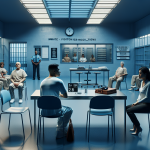Bridgewater State Hospital – Overview and Information
Located in Bridgewater, Massachusetts, Bridgewater State Hospital (BSH) is one of the oldest psychiatric hospitals in the United States. Established in 1834, BSH was originally known as the State Lunatic Hospital at Bridgewater and was the first Massachusetts hospital to treat individuals with mental illnesses, providing specialized treatment and care for people living with mental health or substance abuse challenges.
BSH serves as a hospital for individuals with severe mental illness or other psychological issues. Inpatient services are provided within five units which include psychiatric, detoxification and substance abuse, sexual behavior, geropsychiatry, and truancy programs. BSH also provides outpatient services such as individual and group therapy, medication management, relapse prevention, case management, and counseling.
BSH offers educational programs to help individuals with mental health or substance abuse issues improve their lives. Programs such as the Community Reinforcement Approach, Dialectical Behavior Therapy, Cognitive Behavioral Therapy, and psychopharmacology are available to treat a number of mental health disorders like depression, anxiety and addiction. BSH also provides vocational services, including job training and placement.
BSH also has a research unit, which provides clinical research studies for drug, cancer, and mental health research. Studies focus on studying the impact of psychiatric medications on the mental health disorder, mental health diagnosis strategies, the effects of exercise and nutrition on mental health, and exploring the use of various therapies for the treatment of mental health issues.
Overall, BSH is a comprehensive psychiatric hospital which offers a range of services to treat individuals with mental health or substance abuse issues. BSH is committed to providing the highest quality of care and services to its patients and has become a leader in providing evidence-based therapies and innovative approaches to treatment and care.
Bridgewater State Hospital – Classes, Services, and Programs
Bridgewater State Hospital is a psychiatric hospital located in western Massachusetts. The hospital provides inpatient, outpatient, and community-based services for individuals with mental health challenges. Classes, services, and programs offered by Bridgewater State Hospital include:
Inpatient Services: This offers 24-hour care and treatment for those in need of intensive psychiatric treatment. Bridgewater State Hospital’s inpatient services are designed with the patient’s recovery in mind, with the aim to help them develop the skills needed to return home and live an independent and stable life.
Outpatient Services: This service offers individual, group, and family counseling, as well as medication management. Outpatient services focus on helping individuals understand their behaviors, feelings, and reactions to their environment and providing them with the resources to live an autonomous life.
Community Services: This offers the opportunity to explore the community in a safe, supported environment. The program encourages independence and aims to help clients become active participants in their own recovery.
Classes: Bridgewater State Hospital offers courses in a variety of topics including assertiveness training, conflict resolution, and cognitive behavioral therapy.
Support Groups: The hospital also hosts support groups tailored to help with different aspects of recovery such as mood management, trauma awareness, stress, and anxiety.
Research: Bridgewater State Hospital provides an array of research opportunities, ranging from clinical studies to questions from a wide variety of areas.
The hospital also offers many additional therapeutic activities for inpatients, such as art, music, and pet therapy. Furthermore, the staff at Bridgewater State Hospital provides both group and individual advocacy, case management, and wrap-around services. Bridgewater State Hospital is a great place for individuals to start their journey towards a healthier, happier life.
Inmate visiting application in Bridgewater State Hospital
Inmates at Bridgewater State Hospital often have visitors come to the facility to visit them. All visits must be approved through the Inmate Visiting application process.
The first step for anyone wanting to visit an inmate is to download the application from the hospital’s website. The application requires the visitor’s full name, date of birth, address, phone number and driver’s license information. The application also requests additional information about the visitor’s relationship with the inmate, the purpose of the visit, the date of the proposed visit, and the estimated length of the visit.
Once the application is completed, the visitor must submit it to the hospital’s visiting office. Upon receiving the application, the visiting office will review it and decide if it meets the criteria to be approved. Generally, the application must meet a certain criteria before a visit can take place, such as ensuring the visitor is not someone who has been excluded from an inmate’s unit.
When the application is approved, the visitor will receive an approval letter from the visiting office with instructions on how to complete the visit. This includes the visitor providing a valid government-issued photo identification and signing the hospital’s muster book.
Visitors should also ensure to follow proper safety and security procedures while in the facility. This can include abiding by all rules and regulations of the visiting room, being respectful of the inmate and other visitors in the room, avoiding behavior that might disturb or threaten the safety of others, and leaving all personal belongings outside of the visiting room.
Inmates who receive visits often report a positive outlook and improved mental health. Following the Inmate Visiting Application process allows friends and family to extend much needed support to their incarcerated loved ones.
Bridgewater State Hospital: Frequently Asked Questions and Answers
If you’re looking for information about Bridgewater State Hospital (BSH) in Massachusetts, this guide is for you. Here, we’ll answer some of the most frequently asked questions that many people have about the hospital.
Q: What kind of services does Bridgewater State Hospital provide?
A: BSH provides a comprehensive range of inpatient and outpatient services, from assessment through crisis stabilization to supportive care. Inpatient services include emergency psychiatric care, acute treatment, intensive assessment and evaluation, and short-term residential services. Outpatient services are offered at the main campus and satellite clinics, and include mental health assessments, individual and group therapy, and medication management.
Q: Who can receive services at Bridgewater State Hospital?
A: BSH provides services to all individuals over the age of 18 who have been evaluated and deemed to have a mental health or addiction disorder. The hospital also serves patients with intellectual and developmental disabilities who may require specialized care.
Q: What are the visitation policies?
A: BSH’s visitation policy is subject to change and depends on the patient’s condition and care plan. Generally, patients are allowed to have visitors, but visitation hours are limited and visitors must adhere to the hospital’s overall policies. Visitation is not allowed after 9 p.m. except for emergency situations.
Q: What safety measures are in place for patients and visitors?
A: BSH takes the safety of patients and visitors seriously, and staff are trained in de-escalation techniques. All visitors have their photo ID scanned for security reasons and are required to wear visitor badges while on the premises.
Q: Does Bridgewater State Hospital accept insurance?
A: Yes, most private insurance plans are accepted. For more information on accepted insurance plans, please contact BSH at (800) 662-4357.
We hope that this guide has answered your questions about Bridgewater State Hospital. Remember to contact the hospital directly with any additional questions or concerns you may have.






